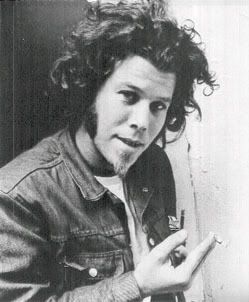Continuum has released the shortlist for the next crop of books they'll publish. Here's a little piece about the list and some of the reaction to it.
What Will Be the Song of the Summer?
3 hours ago
That shall be made integers by their addition.
You ain’t goin to believe this.He shows him a few of the victims.
Knowin you for a born liar I most probably wont.
Somebody has been fuckin my watermelons.
What?
I said somebody has been…
No. No. Hell no. Damn you if you aint got a warped mind.
I’m tellin you…
Looky here.
And here.
It does look like it, dont it?By the way, the so-called “moonlight melon-mounter” ends up becoming one of the main characters in the novel, and one of the most sympathetic, a kind of precursor to All the Pretty Horses' Jimmy Blevins: a lovable sonofabitch, innocently corrupt.
I’m tellin you I seen him. I didnt know what the hell was goin on when he dropped his drawers. Then when I seen what he was up to I still didnt believe it. But yonder they lay.
What do you aim to do?
Hell, I dont know. It’s about too late to do anything. He’s damn near screwed the whole patch. I dont see why he couldnt of stuck to just one. Or a few.
Well, I guess he takes himself for a lover. Sort of like a sailor in a whorehouse.
I reckon what it was he didnt take to the idea of gettin bit on the head of his pecker by one of them waspers. I suppose he showed good judgment there.
What was he, just a young feller?
I dont know how young he was but he was as active a feller as I’ve seen in a good while.
We are come to a world within a world. In these alien reaches, these maugre sinks and interstitial wastes that the righteous see from carriage and car another life dreams. Illshapen or black or deranged, fugitive of all order, strangers in everyland.I thought of Suttree’s world the other day as I drove across the Poplar Street bridge and looked down at the industrial wastes along the riverfront.
Mr. Suttree it is our understanding that at curfew rightly decreed by law and in that hour wherein night draws to its proper close and the new day commences and contrary to conduct befitting a person of your station you betook yourself to various low places within the shire of McAnally and there did squander several ensuing years in the company of thieves, derelicts, miscreants, pariahs, poltroons, spalpeens, curmudgeons, clotpolls, murderers, gamblers, bawds, whores, trulls, brigands, topers, tosspots, sots and archsots, lobcocks, smellsmocks, runagates, rakes, and other assorted and felonious debauchees.The subtitle for this book might be The Seven(ty) Habits of Highly Unsuccessful People. And yet the novel values compassion, understanding, and respect, and shows over and over again these values reflected in the lives of these people. Suttree, “sharing his pain with those who lay in their blood by the highwayside or in the floors of glass strewn taverns or manacled in jail,” reflects that “even the damned in hell have the community of their suffering.”
I was drunk, cried Suttree.
Leave your stepping stones behind, something calls for you.Having waded through 470 more pages of McCarthy, I feel compelled to strike another match and go start anew myself, with another of his books.
Forget the dead you've left, they will not follow you.
The vagabond who's rapping at your door
Is standing in the clothes that you once wore.
Strike another match, go start anew
And it's all over now, Baby Blue.

